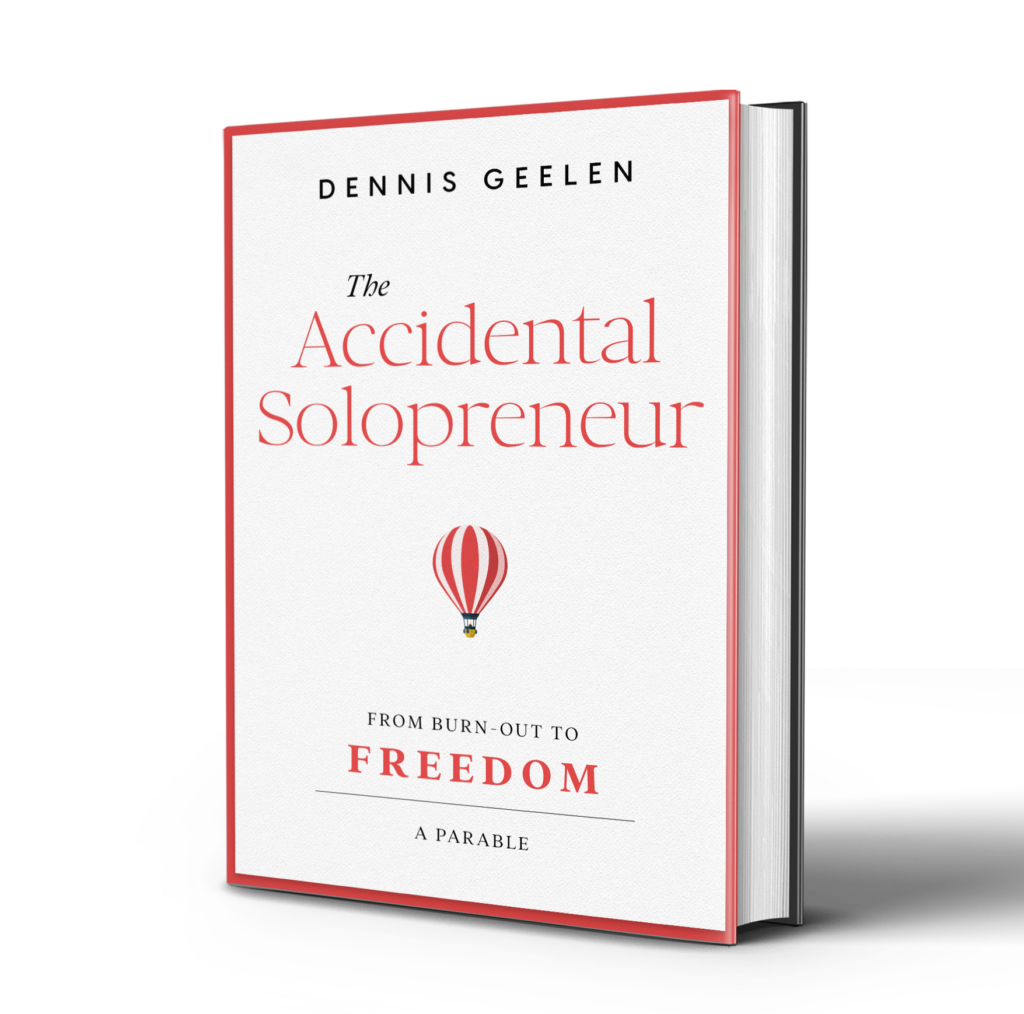The following is an edited transcript
{Greg}
Today I would like to welcome back Dennis Geelen the author of the Zero In Formula. Dennis was a previous guest on SBM #92 titled – The 2 Biggest Mistakes. If you haven’t listened to it, I encourage you to check it out.
The reason for having Dennis join us today, is that he’s launching his new book – The Accidental Solopreneur.
So, welcome back to the Small Business Minute.
{Dennis}
Hey, Greg. Thanks so much for having me back on the podcast. So happy to be here.
{Greg}
So, I thought a good place to is by getting Dennis to share his background as we really didn’t touch on any this the last time he was on.
So my first question is, what prompted you to leave the corporate world and start your journey as a solopreneur consultant?
{Dennis}
So, your question, what prompted me to leave the corporate world and start my journey as a solopreneur consultant?
Well, short answer is I was laid off, at the age of 43, for the first time ever. I was laid off from a corporate job and I decided, hey, why not bet on myself and start my own solopreneur practice?
The longer answer would be I had great encouragement and support from my wife. I had a nice severance package, so I knew that I could give it some time.
I decided to give it a full year. Really try and give it my all and start my own consulting business. And at the end of the year, if things were working great, awesome, I would have no regrets. I would have learned, and I’d be on to something. Just the feeling of betting on myself and making it, would be awesome.
If it didn’t work again, no regrets. I would know that I tried, gave it my all and I would never have that – “What if?” feeling. And I would still be young enough to jump back into the corporate world and probably be a better person because of it.
So that’s really what prompted me. If I hadn’t had been laid off, I never probably would have taken the step. So, I guess it was a blessing in disguise.

{Greg}
We all know there are many ways to become an entrepreneur and to co-opt some words from Shakespeare- “Some are born entrepreneurs, some become entrepreneurs, and some have entrepreneurship thrust upon them”
Being laid-off has always been a common theme for people transitioning to entrepreneurship. This is especially true if one has a decent severance package. As I like to say, it let’s you take your idea for test ride, and judging by the success your enjoying, it certainly seems to have paid off for you.
So, can you share what were some of the biggest mistakes you made early in your journey?
{Dennis}
Yeah, lots, lots of mistakes made early on. Where do I start?
So, when I first started zero in my consulting business, I was very naive.
I just thought, hey, I’ve got 20 plus years of corporate experience. I’ll just announce to the world that I’m a business consultant and I’ll give myself a catchy name, Zero IN.
I’ll create a logo, I’ll create a website, and then I’ll just sit back and watch the clients roll in. Of course, that’s not what happened at all.
I did those things, but the clients didn’t roll in. What I found was I really had to niche down. I really had to be the expert at something. Just calling myself a business consultant really didn’t appeal to anybody. That’s a generalist.
I had to get really specific. What specific business challenges am I helping you solve and for who?
What business is in what industry. So, I really had to go through the process of learning how to be the expert and then building credibility as a consultant.
In in my corporate life people didn’t know me as a consultant. They knew me as a director of professional services or a director of Project Management.
You know, I was not a consultant, so I had to brand myself. I had to build credibility and I had to become the expert. Then I had to learn how to package my services, and sell my services. So, all kinds of mistakes in the beginning. Just assuming that announcing to the world you are a consultant, and you know people will be lining up at your door. I had a lot to learn and luckily had enough runway to be able to make those mistakes and learn from those mistakes.
“who makes more money the heart surgeon or the family physician?”
{Greg}
Focusing (SBM #53) or becoming expert in a given area is one of the hardest lessons for entrepreneurs to learn. That applies equally to companies and not just consultants. It’s a lesson I learned many years ago and it paid off handsomely.
When I sit with struggling entrepreneurs, most can’t identify their target market or ideal customer. That’s because they’ve never really looked at what they do differently or can do better than anyone else.
To drive home the point on focusing, I usually ask the question “who makes more money the heart surgeon or the family physician?” I think we all know the answer.
But to become the expert, it requires discipline and commitment. Discipline, as you point out in the Accidental Solopreneur, to know when to say no to an opportunity if it doesn’t fit. And commitment, to learn everything there is on the subject matter. It’s tough to do, but so worth it!
So let me ask, were you impacted by the pandemic, and if so, how did you pivot?
“I helped companies solve indifference.”
{Dennis}
Yeah, the pandemic. Boy, that really messed up a lot of businesses. So, for me, I was finally rolling, I had figured out my niche.
I helped medium sized businesses with their customer experience and creating a culture of innovation. Or as I like to say it, I helped companies solve indifference. Indifferent customers or indifferent employees. And here’s how you do it.
I had got my package down, my services down. I was doing all kinds of engagements. I was doing all kinds of speaking.
I was doing all kinds of workshops and then boom, the pandemic hits.
So, what I did was OK, now I had runway again. I had just made a bunch of money in the early part of 2020, in late 2019, from having figured things, so I had some time
I was given by the pandemic.
I had some money that I was given by my success. I decided to sit down and write the book the Zero in formula. It’s where I took everything that I was doing with my clients. I put it into a book released in September of 2020, and that’s right when things were starting to open back up again.
And boom, that got me all kinds of exposure and more, you know, companies understanding what I do and who I do it for and how I do it. And because I was on so many podcasts and, you know, there was articles about the book and the book hit bestseller. That really was a blessing in disguise. For me, the pandemic is what allowed me to do that.
{Greg}
So many business owners felt the wrath of Covid. They just weren’t prepared. As much as Covid was a health issue, it was also an economic one as the lockdowns came into play.
Long before Covid, I had always told my clients that you need to have a rainy day fund to survive any form of business slow down or interruption. I was usually thinking along the lines of short term illness or a fire, etc.
Like most people, I never in my wildest dreams would have contemplated a pandemic. However, those that heeded my advice, made it through. It wasn’t pleasant, but they made it.
By having cash reserved, it allows you to continue doing the things that need to be done or as in your case, gave you the opportunity to write Zero In.
I noticed that you now also help other solopreneurs start their own practice, what prompted that new initiative for you?
{Dennis}
Yeah, so a funny thing happened. After a few years in at zero in, things were rolling. I now have a book. I now had online courses.
I was doing all kinds of workshops and consulting engagements and I was just starting to write another business book. I thought, ok, I should have a follow up to the zero in formula. Similar niche, similar type of stuff I’m talking about, but a different spin on things just to keep things fresh.
What I noticed was a lot of people were reaching out to me at this point now saying, hey, I want to do what you did.
Hey, can I pick your brain for a little bit? Hey, I’m starting my own consulting practice. Can you give me a few pointers? Can you give me a few tips?
This was happening through e-mail, through DM’s, the zoom calls, people were wanting to spend time with me and pick my brain. I thought maybe there’s another niche here for me as well while I’ve got zero in going and I can help these medium sized businesses.
I could also start working with other solopreneurs to help them get started, so I pivoted and wrote a very different book.
Instead of the business book I was planning to write, I decided to write a book for solopreneurs and this one, The Accidental Solopreneur, which it ended up being called, is told in a fictional parable format.
I always love those types of books where it’s told in the form of a story with interesting characters. But tips and strategies come out through the book, so that’s what I did there. I started up a whole other side business as well, where now I’m also coaching solopreneurs where they can book calls with me.
I’ve created an online course called the Solopreneur Playbook where I take people through the six steps that I went through, to eventually build a successful solopreneur consulting business.
That’s really been a great new initiative for me, and it was really just prompted by all those people reaching out to ask and I thought there’s a market there. I’ve got expertise, I can help these people.
{Greg}
That certainly sounds like an interesting opportunity. Going into business is never an easy decision and most underestimate what is required.
By the time they do realize that they’re unprepared, they’ve used up their whole runway and have to throw in the towel. Fortunately, for those that get a reality check early in the process, they’ll now have a new resource available in The Accidental Solopreneur and the accompanying playbook.
So that a great segue to my final question. The Solopreneur Playbook that you have developed is based on your new book The Accidental Solopreneur. Can you give a high level overview of the playbook?
{Dennis}
So, like I said, the book came out of that and an online course as well. Really what I show in the book and in the course itself is a 6 step playbook. I call it the Solopreneur Playbook and it’s basically this.
Step 1 Be the expert. Like I said off the top, that was the first mistake I made, I didn’t niche down enough, but it’s easy to say that. How do you do that? What does that look like? So, in the book you get to see how the guy does it in the story.
In the course, there’s all kinds of resources to help you niche down and be the expert.
Step 2 is to build credibility. It’s great that you’ve niched down now, but you’re still probably one of several options in that niche. Why you? How do you build credibility so that people want to choose you instead of your competitors?
So, in the book, again, it shows how the guy does that in the course, all kinds of resources and examples on how to build your credibility.
Step #3 How do you refine? Which is extremely important is how do you refine and offer your services? How do you package them so that you’re not just selling your time for money so you’re not just saying, hey, it’s 100 bucks an hour to work with me?
What’s your proprietary process? How do you package what you do into a certain number of steps or a certain process and then sell it at a fixed price so people feel like they’re buying a proven methodology or a proven product?
I’ve been telling people in the course sell it like it’s a product, package it that way and price It that way.
So how do you do that?
Step #4 How do you sell it? Learning to sell and getting good at sales is so critical because if you don’t have any customers, you don’t have a business.
So, learn to sell is step #4. Now, I tell people in the course, those first four steps are probably going to be iterative.
You’re not going to get it perfect right off the bat. You’re probably have to go through several iterations before you get that, and then you might stop there.
You might have an offering that’s so good and is priced so well that you’re making all kinds of money and you’re helping all kinds of people or businesses and you’re good with that. But if you want to go further, that’s where steps five and six come in.
Step #5 is build an audience. Now, can you have a podcast? Can you have a newsletter? Can, you know, generate a large following on LinkedIn or Twitter so that you can really cash in on Step 6.
Step #6 is to build assets that generate recurring revenue instead of just offering your time and your services.
Can you write books? Can you do online courses?
Can you have people sponsor your podcast or your newsletter?
Can you create Cheat Sheets that people pay for? You know, what can you do now that you’ve built an audience? Build something once and sell it 1000 times.
So that’s the playbook. That’s the six steps. But it’s very important that you do them intentionally and in order, and you do them properly and that’s really what I go through in the book and the course.
“No Sales, No Business!”
{Greg}
Thanks Dennis for that overview. Those 6 steps make a lot of sense and that’s coming from someone who has been there. Step 4 Learn to Sell is the one that stood out for me the most.
Too often entrepreneurs are technically competent, but they lack the ability to properly present their expertise. I have a saying that I use frequently and that is “No sales, no business!” You can have the best mouse trap but if you don’t have any sales skills you’ll never get any customers.
That’s pretty much all the time we have, and I want to thank you for your time today as well as I want to wish great success with the book and the playbook. I’m sure it will help those many solopreneurs who want to grow their practices.
Also, I lied. I have more question for you. How can people contact you?
{Dennis}
Thanks again for having me on, Greg. So great to be here.
Yeah, if people want to get in touch with me, you can reach out through LinkedIn.
Always happy to connect with people there.
Or you can visit my website, www.dennisgeelen.me .
There you can see all about the book. You can see all about the courses or book coaching calls with me. Love to connect with people and help them through their journey.
{Greg}
Dennis has graciously offered a 25% discount for his online course to my listeners. So just head over to my site at gregweatherdon.com and you’ll find a link for the course, the discount code and his new book in the transcript of this interview.
Here is the link to the course – https://dgeelen.gumroad.com/l/solopreneur_playbook Use this promo code for 25% off – tvzvajc
Here’s the link to his book The Accidental Solopreneur
Get More LIFE Out of Your Business
You shouldn’t be the hardest working person in your company.
Many small business owners find that even after the struggling start-up years, they’re working too many hours and still managing every aspect of their businesses.
Greg Weatherdon has been there, done that. As an entrepreneur, he learned not only how to get a business to the point of running smoothly, but also how to reduce the number of hours he worked, delegate more responsibility to his employees, and take longer vacations while his business chugged along like a well-oiled machine. And now he is providing the secret to success.
Do you suffer from any of the following?
1. Business ownership isn’t living up to the dream.
2. Endless workdays.
3. You can’t find good people.
4. Profits are less than expected.
5. You can never take a vacation.
You’re not alone. But there is a solution. As Greg demonstrates, with some time and effort, you really can Get More Life Out Of Your Business.












